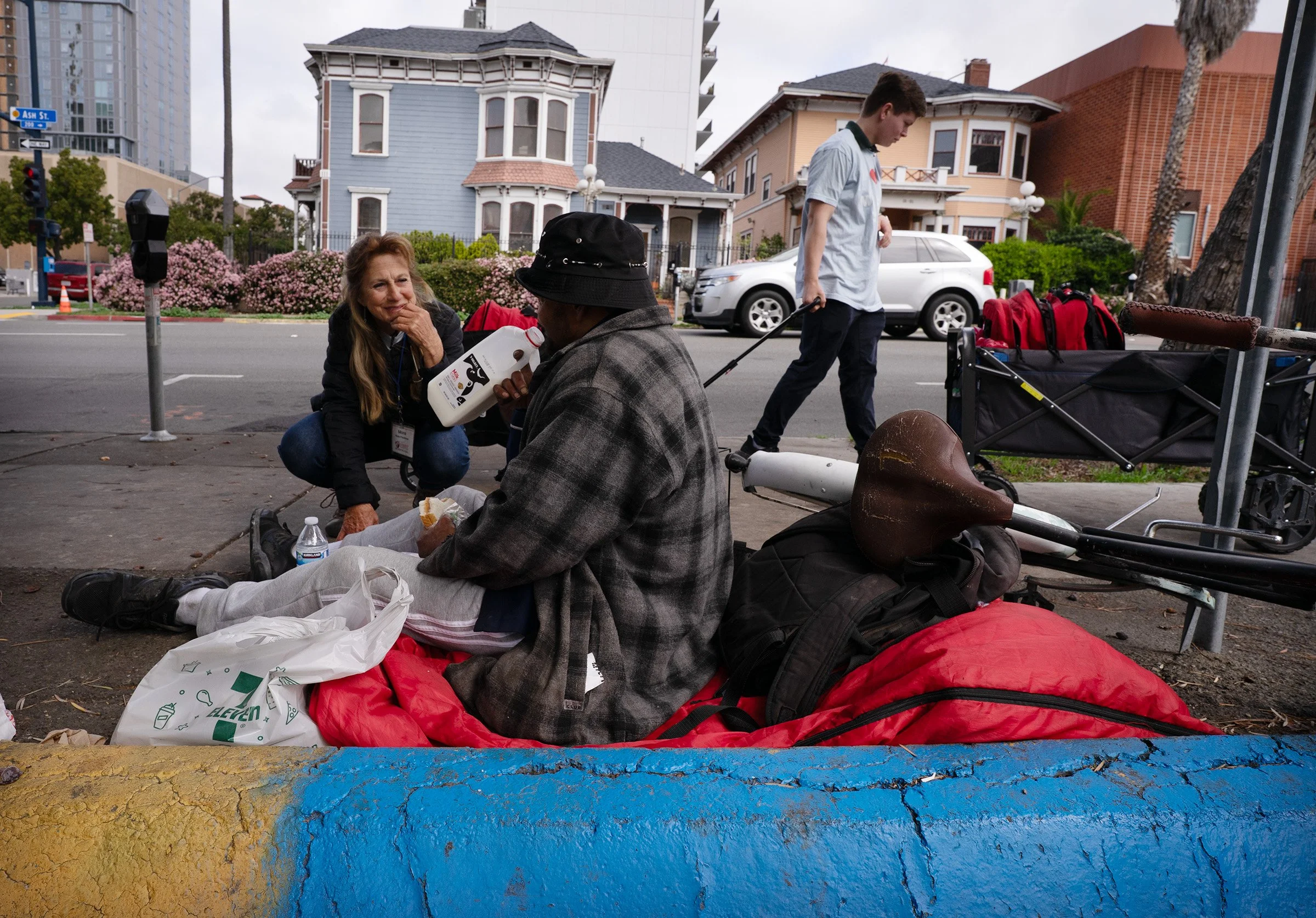Bringing it home...
San Diego’s streets are full of people one paycheck away from a good home, escaping an abusive relationship or the demons of PTSD. When we take the time to stop and talk with people we learn they are families, brothers, mothers, seniors, veterans, teenagers, sisters, all looking for a home. Some find community and protection among each other, some choose to stay in isolated corners. This site is about our shared humanity; a documentary project in words and visuals by award-winning photojournalist Peggy Peattie, who has been telling the stories of America's homeless for nearly 40 years.
Once a month, a team of volunteer healthcare providers - professionals and student volunteers - form the Street Corner Care (SCC) outreach team, pulling carts overflowing with water, snacks, hygiene products, and socks on a meandering path towards the heart of America’s Finest City. The people they encounter need a kind words as much as any sustenance or wound care. The mission is connection, building trust, and inviting people to stop in on Sunday afternoons for a meal, clothing and more organized medical attention operated by the Ladle Fellowship at the First Presbyterian Church. The SCC has exponentially grown its volunteer force since its inception in 2017 as a response to the deadly Hep A outbreak on San Diego’s streets. While students learn an aspect of care that doesn’t come from books, the clients can always count on a year-round spirit of giving.
Robin, 65, has a sociable demeanor that belies a lifetime of physical and mental abuse by the individuals most people are taught to rely on - her mother, and members of law enforcement. She bought and sold cars being sold at police auctions. She would live in some, clean them up, and resell them. That didn’t always work out when the police would tow or confiscate a vehicle that had acquired too many parking tickets. Robin would see younger women appear on the street, especially runaways, being sweet-talked by guys who wanted a blow job. These men would get the women hooked on drugs and then control them by becoming their supplier. “You’d hear people screaming and yelling on the street sometimes - day or night. That was usually some woman suffering from PTSD. They were trapped,” she said.
Victor, 57, has little sympathy for homeless individuals who say they can’t get the help they need. “People out here who aren’t even trying to get into housing or a program or whatever, are just lazy,” he said. He pointed out that anything anyone needs is out there, free. Before he was homeless, Victor said, he worked at US Bank as a loan officer. A painful divorce pushed him in the wrong direction. He said it was stressful to go from seeing his daughters every day, to only seeing them every other week. He realizes now that he lost his real purpose in life - his family. A resourceful person, Victor knows where to get food, clothes or a shower on any given day of the week. Eventually he will move indoors and get a job because his body is feeling the wear and tear of sleeping on concrete. For now, he is traveling light, staying away from certain parts of town, and saying yes when outreach or nonprofit groups offer services.
Some 71 volunteers, six PATH outreach workers, four SD Park Rangers and one state Assembly member trudged through dense growth and spiderwebs at 6 a.m. to count tents, and to offer people hygiene kits, water, and connection to services. This quiet wave of volunteers spent four days (September 25-28) conducting field surveys for the fall census of unhoused individuals living in the riverbed.In total, 323 people were counted, reflecting a 14.9% decrease since the spring census count (281). Organizers pointed out that it is important to consider that in the spring there are less people camping in the river because of the rain and the height of the river itself. The overall number is down by 100 people from fall of 2024 (423).



















